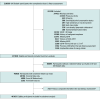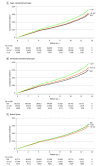Sweetened Beverage Intake and Incident Chronic Kidney Disease in the UK Biobank Study
- PMID: 38416492
- PMCID: PMC10902724
- DOI: 10.1001/jamanetworkopen.2023.56885
Sweetened Beverage Intake and Incident Chronic Kidney Disease in the UK Biobank Study
Abstract
Importance: An increasing body of evidence indicates an association between consuming sugar or its alternatives and cardiometabolic diseases. However, the effects of the consumption of sugar-sweetened beverages, artificially sweetened beverages, and natural juices on kidney health remain unclear.
Objective: To investigate the association of the intake of sugar-sweetened beverages, artificially sweetened beverages, and natural juices with the risk of chronic kidney disease (CKD), and the effect of substituting these beverage types for one another on this association.
Design, setting, and participants: This prospective, population-based cohort study analyzed data from the UK Biobank. Participants without a history of CKD who completed at least 1 dietary questionnaire were included. The follow-up period was from the date of the last dietary questionnaire until October 31, 2022, in England; July 31, 2021, in Scotland; and February 28, 2018, in Wales. Data were analyzed from May 1 to August 1, 2023.
Exposures: Consumption of sugar-sweetened beverages, artificially sweetened beverages, and natural juices.
Main outcomes and measures: The primary outcome was incident CKD. Multivariable Cox proportional hazards models were used to estimate the associations between the 3 beverage types and incident CKD. A substitution analysis was used to evaluate the effect on the associations of substituting one beverage type for another.
Results: A total of 127 830 participants (mean [SD] age, 55.2 [8.0] years; 66 180 female [51.8%]) were included in the primary analysis. During a median (IQR) follow-up of 10.5 (10.4-11.2) years, 4459 (3.5%) cases of incident CKD occurred. The consumption of more than 1 serving per day of sugar-sweetened beverages was associated with higher risk of incident CKD (adjusted hazard ratio [AHR], 1.19 [95% CI, 1.05-1.34]) compared with not consuming sugar-sweetened beverages. The AHR for participants consuming more than 0 to 1 serving per day of artificially sweetened beverages was 1.10 (95% CI, 1.01-1.20) and for consuming more than 1 serving per day was 1.26 (95% CI, 1.12-1.43) compared with consuming no artificially sweetened beverages. By contrast, there was no significant association between natural juice intake and incident CKD (eg, for >1 serving per day: HR, 0.99 [95% CI, 0.87-1.11]; P = .10). Substituting sugar-sweetened beverages with artificially sweetened beverages did not show any significant difference in the risk of CKD (HR, 1.03 [95% CI, 0.96-1.10]). Conversely, replacing 1 serving per day of sugar-sweetened beverage with natural juice (HR, 0.93 [95% CI, 0.87-0.97]) or water (HR, 0.93 [95% CI, 0.88-0.99]) or replacing 1 serving per day of artificially sweetened beverage with natural juice (HR, 0.90 [95% CI, 0.84-0.96]) or water (HR, 0.91 [95% CI, 0.86-0.96]) was associated with a reduced risk of incident CKD.
Conclusions and relevance: Findings from this cohort study suggest that lower consumption of sugar-sweetened beverages or artificially sweetened beverages may reduce the risk of developing CKD.
Conflict of interest statement
Figures


References
MeSH terms
Substances
LinkOut - more resources
Full Text Sources
Medical

